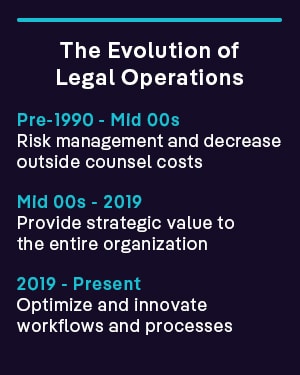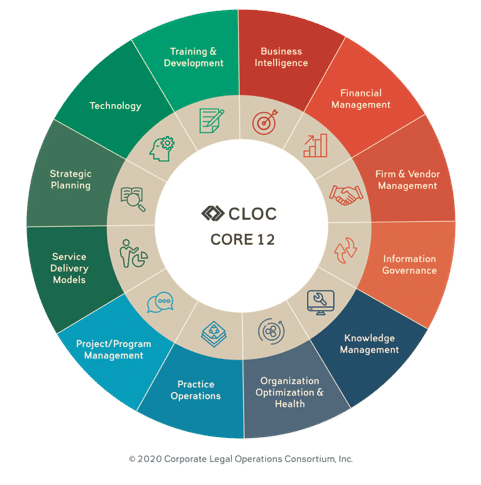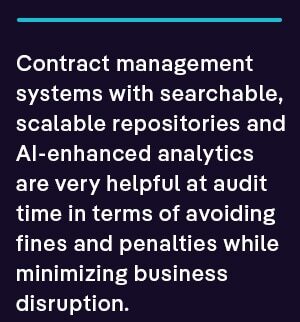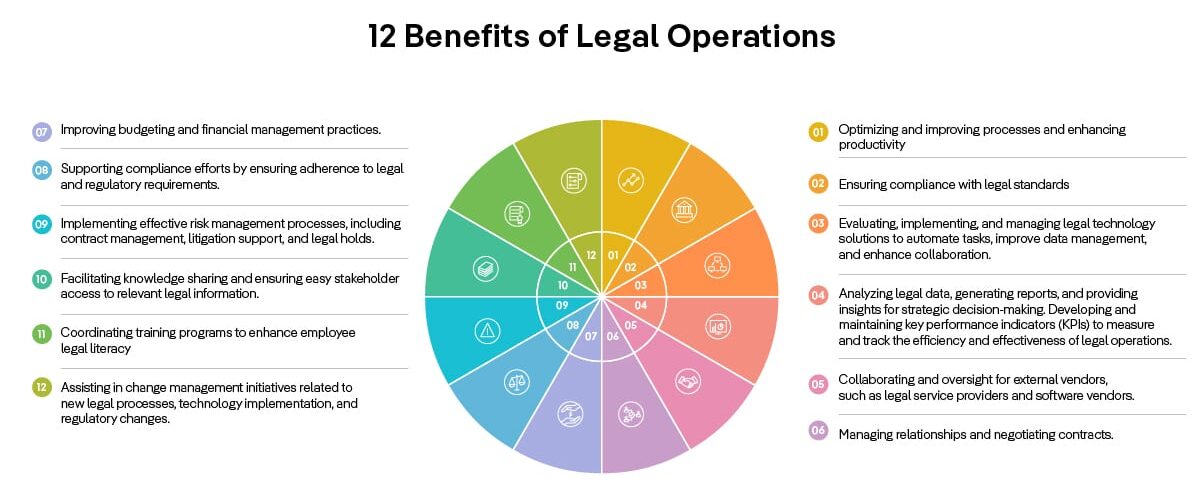In-house legal teams and law firms often seem unique, unlike other departments like human resources, finance, and project management. Yet, corporate legal departments rely on these legal operations (AKA legal ops) functions to deliver on their mandates and objectives. When provided with efficient legal services and a strategic business approach, the company benefits more as a whole. Legal departments historically operate(d) as cost centers. Without the proper tools, many lack(or lacked) the productivity and efficiency to show adequate returns on their company’s investment. Like with other cost and profit centers, the goals of significant digital transformation initiatives are often geared toward making legal operations more efficient and productive while delivering more strategic value.
The Evolution of Legal Operations 
In recent years, many in-house legal departments have proactively taken on more consultative and advisory roles within their organizations. By implementing legal platforms and applications, they accelerate their delivery of legal services while addressing legal ops with greater speed and agility. Legal departments have greater access to legal technology, such as internal and external repositories, which garners information and tools to mine vast amounts of data.
Legal operations teams, which include general counsels, lawyers, paralegals, and contract managers, are generally highly motivated, detail-oriented, intelligent people with desirable skills and expertise, such as strategic planning. A legal operations director would usually be in charge of managing everyone.
Proper legal operations management need support, education, and insights to help their colleagues and leadership team to manage risks like partnerships and acquisitions and defend their company’s interests in court as needed. And, then, there are responsibilities like conducting legal research, contract review and authorship, consulting executives on strategic decisions, and ensuring their company (and its suppliers) meet its contractual obligations.
Many companies are contracting fewer outside legal services than before or working with a law firm for non-traditional reasons. Legal departments are evolving to take on more responsibilities outside what most of us would typically consider legal industry. Legal ops function manage these processes with less intervention from cross-functional groups like IT, finance, and human resources than expected.
The 12 Key Functions of Legal Ops
To truly understand what is legal operations, you must also know its components. Here are the leading legal operations functions, according to the Corporate Legal Operations Consortium (CLOC):
1. Business Intelligence
Data scientists and analysts in the data and business intelligence (BI) arenas are increasingly crucial to corporate legal departments. There are vast repositories of legal data involved in assessing the risks and upsides associated with employment candidate onboarding, partner prospecting, and business partner, supplier, and vendor management.
A business intelligence analyst can help a legal operations professional answer these questions by providing data analytics and insight into legal matters. Take a workers’ compensation case associated with a severe factory workplace injury due to a machine malfunction:
Descriptive Reports – What happened?
The BI analyst needs to research reports which describe scenarios like where a malfunctioning machine was manufactured, how often it was used leading up to the breakdown, whether anyone was injured if the machine has any manufacturer recalls or is prone to malfunction as it did.
Diagnostic Reports – Why did it happen?
BI reporting can reveal data points and patterns, like whether the machine operators assigned to a machine were trained or whether the equipment was properly maintained. Were proper safeguards in place, and who was on the shop floor who may have witnessed the incident?
Predictive Analysis – Will it happen again?
Predictive reporting can gather statistics from available sources of information relating to similar workplace accidents, whether a company has other machinery in use in their factories, and the operator experience and training histories associated with that equipment.
Prescriptive Reports – How can similar incidents be prevented?
A senior BI analyst may be tasked to generate reports and data visualizations and make recommendations on how to avoid similar workplace accidents and injuries.
Legal operations resources, such as data analytics, can minimize liability and costs for historical matters and establish less risky business practices for the future. Human analysts may need the assistance of an artificial intelligence (AI) bot to help with these analyses where there is too much data and too little time to source needed insights.
2. Financial Management
There are many reasons why in-house legal departments can miss their budget forecasts. For example, a company may need to hire outside attorneys more often than estimated. Or, an unexpected opportunity or challenge might arise. Implementing a digital platform that can flex, scale, and assist with financial planning is as important for legal departments. As is having the people and processes to work with it effectively.
3. Firm and Vendor Management
Building and sustaining relationships with suppliers and service providers can be challenging over time. A vendor may enter a relationship capable of meeting your company’s needs, but they may not be able to meet expectations for quality, speed, and cost as your business evolves. Vendor management is essential to business growth.
Legal operations professionals can help to protect their company’s interests in these relationships by ensuring contracts clearly state vendor obligations. They should also have good judgment in assessing whether vendor contracts should be renewed or how to terminate a contract when agreed terms aren’t being met.
4. Information Governance
Managing records like contracts in ways that comply with government and company policies and industry regulations is critical to the success and reputation of any company. Implementing and following retention schedules for digital and physical records is critical to surviving audits and being litigation-ready.
Permission controls over which of your employees can find, read, or have other digital rights to your documents are vital for good governance.
Contract management systems with searchable, scalable repositories and AI-enhanced analytics can be very helpful at audit time in terms of avoiding fines and penalties while minimizing business disruption.
5. Knowledge Management
If you have valuable intellectual capital stored in your shared repositories, but they can’t be found, and the people who wrote and archived them have left your company, you have brain drain.
Establishing, enforcing, and automating effective information taxonomy can help prevent the loss of valuable information about your employees, customers, partners, and suppliers. Information that you can learn from and repurpose over relatively long periods, despite staff turnover or changing business relationships.
6. Organization Optimization and Health
Legal professionals have the same needs for career coaching, mentorship, skills development, and job satisfaction as their line of business counterparts. They need skills development training, objective and fair hiring and offboarding processes, and equitable work-life balance consideration.
The pressure of heavy burdens of legal reviews, late hours, and sedentary work can be demoralizing and counterproductive. Legal executives need the support of HR, wellness programs, and other resources to keep their teams engaged, focused, and balanced for the near term and the future.
Optimized teams believe in their organization’s vision, and they need innovative solutions to empower them to deliver to the best of their ability.
7. Practice Operations
Marketing, sales, and engineering departments all have integrated, SaaS-based application stacks like Salesforce.com, Microsoft Dynamics 365, and SAP. Most legal practice operations stacks over the years have targeted personnel at a law firm, instead of in-house legal.
The ContractPodAi One Legal Platform and complementary services support digital workflows for processes like:
- Legal Intake
- Contract lifecycle management, including analytics
- Intellectual capital management
- Executive and board-level dashboards
- Governance, Risk, and Compliance (GRC)
- Document review and translation
Whether your company does business globally or nationally, having an integrated legal platform can mitigate your risk and improve business outcomes.
8. Project Program Management
Project management and practicing the law require attention to detail, strong communication skills, and exceptional organizational skills. Yet each profession requires other skills like leading M&A integrations or guiding the company through meeting security and privacy regulations or corporate restructuring.
Project and program managers can gather the information and provide the logistics oversight to make these initiatives successful. Meanwhile, legal professionals address legal risks and mitigate program or project liability.
9. Service Delivery Models
For many businesses, outsourcing relationships like contract manufacturing enables them to focus on their strengths, like sales, channel management, and distribution. Vendor management also requires special skills and experience to support the legal organization and ensure obligations are met.
The default vendor for a service may be the best known for the job, but there may be more capable service providers with better terms and lower costs that are just out of reach without additional research of service delivery models.
10. Strategic Planning
Many legal departments, especially in-house legal teams, can only manage the short-term workload on their desks and swirling around their offices. They don’t have the time or resources to think and plan ahead for what is coming down the road or is just over the horizon.
Strategic planning professionals understand change management, including the change that seems to move at a glacial pace. They can research and explore long-term circumstances and see the big picture of initiatives like product lifecycles, strategic acquisitions, or globalization.
Strategic planners with futurist mindsets are important members of legal ops teams.
11. Training and Development
Legal practitioners need ongoing career coaching, mentorship, and skills development as their line of business counterparts. To keep pace with changing legal tech trends and circumstances, they need skills development, soft skills training, and to be empowered to have career growth conversations with their manager.
12. Technology
Despite the availability of integrated SaaS platforms, connectors, and APIs, many companies still have a galaxy of disjointed departmental applications and manual processes. Legal ops teams can create a vision for their company’s legal processes that work cohesively with enterprise technologies, such as legal tech.
SaaS platforms don’t have the infrastructure overhead or cost of on-premises software, enabling legal teams to configure and tailor technology to their needs with less IT involvement.
The legal department’s applications, like contract management software, shouldn’t be siloed off from the rest of the organization. Legal tech should sync important document repositories, workflow engines, and analytics services while automating contract creation and review. It will help the enterprise to accelerate negotiations and shorten sales and procurement cycles without adding undue risk or compromising company standards.
12 Benefits of Legal Operations
Legal operations teams play a crucial role in supporting the efficient and effective functioning of the overall legal department.
They are key players in:
- Optimizing and improving processes and enhancing productivity
- Ensuring compliance with legal standards
- Evaluating, implementing, and managing legal technology solutions to automate tasks, improve data management, and enhance collaboration.
- Analyzing legal data, generating reports, and providing insights for strategic decision-making. Developing and maintaining key performance indicators (KPIs) to measure and track the efficiency and effectiveness of legal operations.
- Collaborating and oversight for external vendors, such as legal service providers and software vendors.
- Managing relationships and negotiating contracts.
- Improving budgeting and financial management practices.
- Supporting compliance efforts by ensuring adherence to legal and regulatory requirements.
- Implementing effective risk management processes, including contract management, litigation support, and legal holds.
- Facilitating knowledge sharing and ensuring easy stakeholder access to relevant legal information.
- Coordinating training programs to enhance employee legal literacy
- Assisting in change management initiatives related to new legal processes, technology implementation, and regulatory changes.
How Software Empowers Legal Operations
Integrated platforms for law firms and in-house legal departments:
- Provide crucial document management functions like version control, metadata profiling, searchability, collaboration, and workflow.
- Facilitate legal case and legal matter intake and management.
- Enable paralegals to research statutes, precedents, potential conflicts of interest, and other legal research databases like Lexis Nexis.
- Provide full-lifecycle contract management from authoring and review to approvals and signoff and obligation management and renewals.
- E-Discovery to legal teams to manage large repositories of legal data related to precedents and other related documents and structured and unstructured data.
- Compliance management to track regulatory changes and review contracts to ensure they are audit-ready and don’t subject a company to potential fines or penalties.
- Legal analytics to track obligations, milestones, and contract renewals.
End-to-End Legal Ops with ContractPodAi
Are you looking for a purpose-built practice platform for your in-house legal ops team? Ensure you partner with a company like ContractPodAi that understands the full spectrum of what is legal operations and what requirements, roles, and responsibilities need to be supported.
To learn more about how an AI-powered legal solution can benefit your organization in the near term and strategically in the long run, watch our webinar, The Real Impact of AI on Legal Ops.





